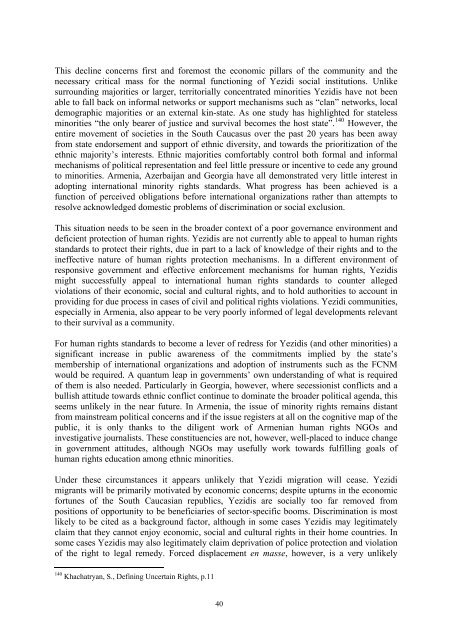The Human Rights situation of the Yezidi minority - UNHCR
The Human Rights situation of the Yezidi minority - UNHCR
The Human Rights situation of the Yezidi minority - UNHCR
You also want an ePaper? Increase the reach of your titles
YUMPU automatically turns print PDFs into web optimized ePapers that Google loves.
This decline concerns first and foremost <strong>the</strong> economic pillars <strong>of</strong> <strong>the</strong> community and <strong>the</strong><br />
necessary critical mass for <strong>the</strong> normal functioning <strong>of</strong> <strong>Yezidi</strong> social institutions. Unlike<br />
surrounding majorities or larger, territorially concentrated minorities <strong>Yezidi</strong>s have not been<br />
able to fall back on informal networks or support mechanisms such as “clan” networks, local<br />
demographic majorities or an external kin-state. As one study has highlighted for stateless<br />
minorities “<strong>the</strong> only bearer <strong>of</strong> justice and survival becomes <strong>the</strong> host state”. 140 However, <strong>the</strong><br />
entire movement <strong>of</strong> societies in <strong>the</strong> South Caucasus over <strong>the</strong> past 20 years has been away<br />
from state endorsement and support <strong>of</strong> ethnic diversity, and towards <strong>the</strong> prioritization <strong>of</strong> <strong>the</strong><br />
ethnic majority’s interests. Ethnic majorities comfortably control both formal and informal<br />
mechanisms <strong>of</strong> political representation and feel little pressure or incentive to cede any ground<br />
to minorities. Armenia, Azerbaijan and Georgia have all demonstrated very little interest in<br />
adopting international <strong>minority</strong> rights standards. What progress has been achieved is a<br />
function <strong>of</strong> perceived obligations before international organizations ra<strong>the</strong>r than attempts to<br />
resolve acknowledged domestic problems <strong>of</strong> discrimination or social exclusion.<br />
This <strong>situation</strong> needs to be seen in <strong>the</strong> broader context <strong>of</strong> a poor governance environment and<br />
deficient protection <strong>of</strong> human rights. <strong>Yezidi</strong>s are not currently able to appeal to human rights<br />
standards to protect <strong>the</strong>ir rights, due in part to a lack <strong>of</strong> knowledge <strong>of</strong> <strong>the</strong>ir rights and to <strong>the</strong><br />
ineffective nature <strong>of</strong> human rights protection mechanisms. In a different environment <strong>of</strong><br />
responsive government and effective enforcement mechanisms for human rights, <strong>Yezidi</strong>s<br />
might successfully appeal to international human rights standards to counter alleged<br />
violations <strong>of</strong> <strong>the</strong>ir economic, social and cultural rights, and to hold authorities to account in<br />
providing for due process in cases <strong>of</strong> civil and political rights violations. <strong>Yezidi</strong> communities,<br />
especially in Armenia, also appear to be very poorly informed <strong>of</strong> legal developments relevant<br />
to <strong>the</strong>ir survival as a community.<br />
For human rights standards to become a lever <strong>of</strong> redress for <strong>Yezidi</strong>s (and o<strong>the</strong>r minorities) a<br />
significant increase in public awareness <strong>of</strong> <strong>the</strong> commitments implied by <strong>the</strong> state’s<br />
membership <strong>of</strong> international organizations and adoption <strong>of</strong> instruments such as <strong>the</strong> FCNM<br />
would be required. A quantum leap in governments’ own understanding <strong>of</strong> what is required<br />
<strong>of</strong> <strong>the</strong>m is also needed. Particularly in Georgia, however, where secessionist conflicts and a<br />
bullish attitude towards ethnic conflict continue to dominate <strong>the</strong> broader political agenda, this<br />
seems unlikely in <strong>the</strong> near future. In Armenia, <strong>the</strong> issue <strong>of</strong> <strong>minority</strong> rights remains distant<br />
from mainstream political concerns and if <strong>the</strong> issue registers at all on <strong>the</strong> cognitive map <strong>of</strong> <strong>the</strong><br />
public, it is only thanks to <strong>the</strong> diligent work <strong>of</strong> Armenian human rights NGOs and<br />
investigative journalists. <strong>The</strong>se constituencies are not, however, well-placed to induce change<br />
in government attitudes, although NGOs may usefully work towards fulfilling goals <strong>of</strong><br />
human rights education among ethnic minorities.<br />
Under <strong>the</strong>se circumstances it appears unlikely that <strong>Yezidi</strong> migration will cease. <strong>Yezidi</strong><br />
migrants will be primarily motivated by economic concerns; despite upturns in <strong>the</strong> economic<br />
fortunes <strong>of</strong> <strong>the</strong> South Caucasian republics, <strong>Yezidi</strong>s are socially too far removed from<br />
positions <strong>of</strong> opportunity to be beneficiaries <strong>of</strong> sector-specific booms. Discrimination is most<br />
likely to be cited as a background factor, although in some cases <strong>Yezidi</strong>s may legitimately<br />
claim that <strong>the</strong>y cannot enjoy economic, social and cultural rights in <strong>the</strong>ir home countries. In<br />
some cases <strong>Yezidi</strong>s may also legitimately claim deprivation <strong>of</strong> police protection and violation<br />
<strong>of</strong> <strong>the</strong> right to legal remedy. Forced displacement en masse, however, is a very unlikely<br />
140 Khachatryan, S., Defining Uncertain <strong>Rights</strong>, p.11<br />
40
















